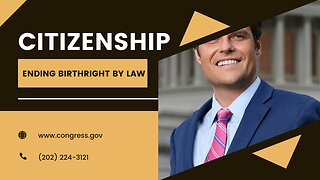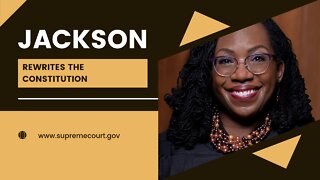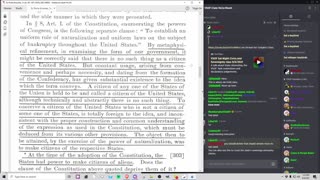Citizenship and Constitutional reform
Citizenship and Constitutional reform
By Terry A. Hurlbut
Citizenship – by birthright, in any case – has once again become a Presidential campaign issue. In 2018, then-President Donald J. Trump proposed to end birthright citizenship by executive order. Four weeks ago he proposed the same for his reelection campaign. Naturally this has people looking at the Supreme Court case law on the subject of citizenship. Tellingly, these people – most of whom are not lawyers – don’t understand how confused that case law really is. Various obiter dicta (by-the-way sayings) in at least two key cases only add to the confusion. The case of Presidential eligibility is more complex still, several generations removed from the Constitutional Convention of 1787. So Americans, at their next opportunity, must reform the Constitution to clarify questions of citizenship and Presidential eligibility.
Traditional birthright citizenship
By long and (so far) unchallenged tradition, the common law recognizes two ways to establish birthright citizenship:
• Jus soli (the Law of the Soil), according to which a person is a birthright citizen of the country on the soil of which he is born, and
• Jus sanguinis (the Law of the Blood), according to which a person inherits the citizenship of his parent(s).
Jus soli is an English common law philosophy, whereas jus sanguinis derives from Roman law.
Thus far the Constitution has never had to specify citizenship by jus sanguinis. Courts have generally recognized jus sanguinis in the case of a person born to two citizen parents. When only one parent is a citizen, that weakens the jus sanguinis claim. For that reason, many countries attach continuous residency requirements to the citizen parent to validate a jus sanguinis claim.
The jus soli claim excites the greatest controversy. Does it, or does it not, apply to a child born to a non-permanent resident? His Majesty’s Kingdom in fact says no.
https://twitter.com/SandraLogmein/status/1663541382924075010
Nevertheless, we have the Fourteenth Amendment, which reads in relevant part:
All persons born or naturalized in the United States, and subject to the jurisdiction thereof, are citizens of the United States and of the State wherein they reside.
Judge Andrew P. Napolitano firmly believes that settles it: a jus soli claim is absolute. But in fact the case of U.S. v. Wong Kim Ark, 169 U.S. 649 (1898), doesn’t quite hold that. Here is its holding:
citizenship as prescribed in the Fourteenth Amendment extends to U.S.-born children of foreign subjects or citizens who, at the time of the child’s birth, are permanent residents and are carrying on business in the United States.
Jus soli also assigns citizenship to place of birth if otherwise the child would be stateless.
Technological complications
Furthermore, common law does not seem to have kept up with advances in transportation. What are the limits of the territory of a country? International law recognizes ocean waters bordering a country’s coast for a fixed distance as the “territorial waters” of that country. Likewise, the air above the lands or waters of a country constitutes its “territorial airspace.”
To complicate matters further, transportation over long distances is no longer as hazardous as it once was. During the Roman Empire, and at the formation of English common law, no woman would dream of traveling by ship while pregnant. And air travel would not become imaginable until two bicycle repairmen built and tested a heavier-than-air powered craft at Kitty Hawk, North Carolina, in 1903.
In fact, the Convention on the Reduction of Statelessness provides that the country under whose flag any ship sails, or any aircraft flies, is the birthright citizenship country of last resort for any child born aboard such a ship or aircraft while said ship or aircraft is in international waters or airspace. (That is, unless the child can inherit the citizenship of his or her parents.) Logically, therefore, a child born in the territorial waters or airspace of any country rates the same consideration such a child would have if born on land. The question, then, is: does a woman giving birth aboard ship or aircraft qualify as doing business in the country of registry, or the country owning the waters or airspace involved?
Presidential eligibility
Presidential eligibility is another matter altogether – or should be. During the Constitutional Convention, John Jay, co-author of The Federalist and first Chief Justice of the United States, recognized at once that a child born in one country to citizens of another had a choice of birthright citizenship to claim. Such a child had dual loyalty. John Jay specifically wanted Presidents of the United States to own no loyalty to any country except the United States.
In Emmerich de Vattel’s Law of Nations (1758), he found his answer. Book 1, Chapter 19, section 212 clearly defines a natural-born citizen as “born in the country, of parents who are citizens.” Furthermore, Vattel settles all the other jus soli questions arising from transportation or offshore birth. So a person born in territorial waters is born in-country, and a person born in international waters is born in the country whose flag that ship aboard which he was born, flies. But jus sanguinis clearly takes precedence in Vattel’s treatment – logical, because jus sanguinis is an older tradition.
Also: a child born to a person on any military or diplomatic station, he deems born in-country. So Congress properly deemed Sen. John McCain (R-Ariz.) a natural-born citizen, because he was born on an American naval base in the Panama Canal Zone. (The Wong Kim Ark case does hold that children of foreign diplomats do not rate American birthright citizenship.)
Presidents who skated on natural-born citizenship
Three Presidents of the United States have been recognized as elected, who were not natural-born citizens by Vattel’s definition. Thomas Jefferson was the first. Why not George Washington or John Adams? Because in the formation of the United States, all relevant authorities deemed persons born in what became the territory of the United States, to persons who were British colonial subjects at the time, to be citizens. (Slavery is an unfortunate chapter that Vattel did not even treat. CNAV takes the position that the intended and actual effect of Amendment XIV was to recognize former slaves as citizens.) So the proposition that “the first natural-born citizens were persons born in America after July 4, 1776” is false. The Constitutional Convention, under John Jay’s urging, clearly meant to recognize all persons born in America to American colonists, as natural-born citizens.
But Thomas Jefferson was born in France to two American colonials. Not wishing to leave him out, Article II Section 1 Clause 5 says that “a citizen of the United States at the time of the adoption of this Constitution” would still be eligible to the office of President.
Chester A. Arthur, John Garfield’s running mate, skated on this requirement – because his parents were not both citizens. He became President with the assassination of Garfield. Under Amendment XII, no Presidential Elector candidate should have pledged to vote for him.
They did, because the Constitution provides no enforcement mechanism for Presidential eligibility. And: because people had forgotten what a natural-born citizen is!
Properly recognizing citizenship in the Constitution
In February 2005, then-Rep. Nathan Deal (R-Ga.) introduced his Citizenship Reform Act to redefine birthright citizenship. It would have declared a child a citizen only if the mother was a citizen or lawful permanent resident. (If the child was born in lawful wedlock, the father could also be the qualifying citizen parent.) Sadly, that Act did not pass.
In the spirit of Donald Trump’s proposal and Vattel’s Law of Nations, CNAV offers this new Constitutional amendment:
Section 1: With respect to Presidential and Vice-Presidential eligibility, the phrase natural-born citizen shall refer to one born in-country, or on any diplomatic or military station of the United States, provided that both said person’s parents shall be citizens of the United States at the time of the birth of the subject person.
Section 2: No State shall appoint any Presidential Elector subject to any pledge to vote for a candidate for President or Vice-President who shall not meet this and all other requirements for Presidential eligibility; neither shall the Congress appoint, or allow to be appointed, any Presidential Elector for the District of Columbia subject to such a pledge to vote for such ineligible person; neither shall any vote for a Constitutionally ineligible candidate be considered valid.
Section 3. The Congress of the United States shall have the duty and authority to enjoin the certification of any Constitutionally ineligible candidate for President or Vice-President as qualified. Furthermore, if a candidate can establish reasonable grounds to suspect fraudulent or other criminal interference in the appointment of Presidential Electors, the Congress shall have the duty to investigate any such allegations. The Supreme Court of the United States shall likewise have appellate jurisdiction in any controversy arising out of the election of a Constitutionally ineligible President or Vice-President by reason of dereliction by the Congress of any duty specified above.
Section 4: With respect to citizenship in the United States by reason of birth:
Clause 1: No person, born in-country or on any diplomatic or military station of the United States, shall be considered a citizen by birth unless at least one parent shall be a citizen or permanent resident of the United States at the time of the subject person’s birth. If the subject person is born out-of-wedlock, then he or she shall be considered a citizen by birth only if the mother is a citizen or permanent resident of the United States at that time.
Clause 2: No person, born in a place other than the above places, shall be considered a citizen by birth unless both parents shall be citizens at the time of the subject person’s birth.
Section 5: The phrase born in-country, as used in this Article or any law made pursuant thereto, shall refer to persons born in the territory of the United States, or in the territorial waters or airspace of the United States, or aboard any ship or aircraft registered in the United States or belonging to any of its armed services, so long as said ship or aircraft is in international waters or airspace at the time of the birth of such person.
The above treats all the questions Vattel treated, even to the application of citizenship to persons born “at sea.” (The treatment of persons born in the air, follows logically from Vattel’s treatment of persons born at sea.) It would also authorize – indeed direct – the Congress to enforce Presidential eligibility requirements. Furthermore it would direct the Congress to investigate allegations of the kind of fraud alleged in the Election of 2020.
Perhaps only another 1800-like Constitutional crisis can induce Congress to propose, and the States to ratify, such an amendment. But already some are asking openly why men like former Gov. Arnold Schwarzenegger (R-Calif.) or entrepreneur Elon Musk are not eligible to the office of President. An amendment like this would settle that question.
Link to:
The article:
https://cnav.news/2023/06/26/editorial/talk/citizenship-constitutional-reform/
Tweet describing new jus soli restrictions:
https://twitter.com/SandraLogmein/status/1663541382924075010
Case citation: U.S. v. Wong Kim Ark
https://www.law.cornell.edu/wex/united_states_v._wong_kim_ark
Vattel E., The Law of Nations, Book 1 Chapter 19
https://lonang.com/library/reference/vattel-law-of-nations/vatt-119/
Declarations of Truth Twitter feed:
https://twitter.com/DecTruth
Conservative News and Views:
https://cnav.news/
The CNAV Store:
https://cnav.store/
Our Silver Lines
https://oursilverlines.com/
-
 16:12
16:12
Declarations of Truth
10 months agoBirthright citizenship – Matt Gaetz would end it
335 -
 20:19
20:19
Declarations of Truth
1 year agoJackson rewrites the Constitution
1253 -
 8:53
8:53
Governmental Corporation Watch
5 months ago🔥e11- "UN Nationals"🤯😱 Actual Global Citizenship From WW2 Treaty 🌎🎫❤️🔥 #deepstate #unitednations
368 -
 22:39
22:39
Mr. Constitution Douglas V. Gibbs
1 year agoPresidential Election Reform Act
1861 -
 32:30
32:30
Mark Levin Show
2 years agoThe Constitution And Elections Explained
10.2K73 -
 48:22
48:22
Vocational Science of Freedom
2 months ago🦅 Sovereignty 🦅 We the People do not yield our Sovereignty to the agencies that serve us⚡ 2024-4-6
7062 -
 56:20
56:20
Vocational Science of Freedom
6 months ago🔵State Citizenship - Ex-parte Knowles and VSOF Task Committees. 2021-09-04
9422 -
 5:12
5:12
Governmental Corporation Watch
5 months ago🔥e7- PSA UN UDHR Has Replaced 📜The US Constitution Bill Of Rights🇺🇳⚖️⛓️☠️
212 -
 6:39
6:39
We The People - Constitutional Conventions
1 year agoConstitution of The Sovereigns'
2.75K25 -
 4:28
4:28
TRUTH SCIENCE151
3 months agoSOVEREIGN CITIZEN IN COURT
266